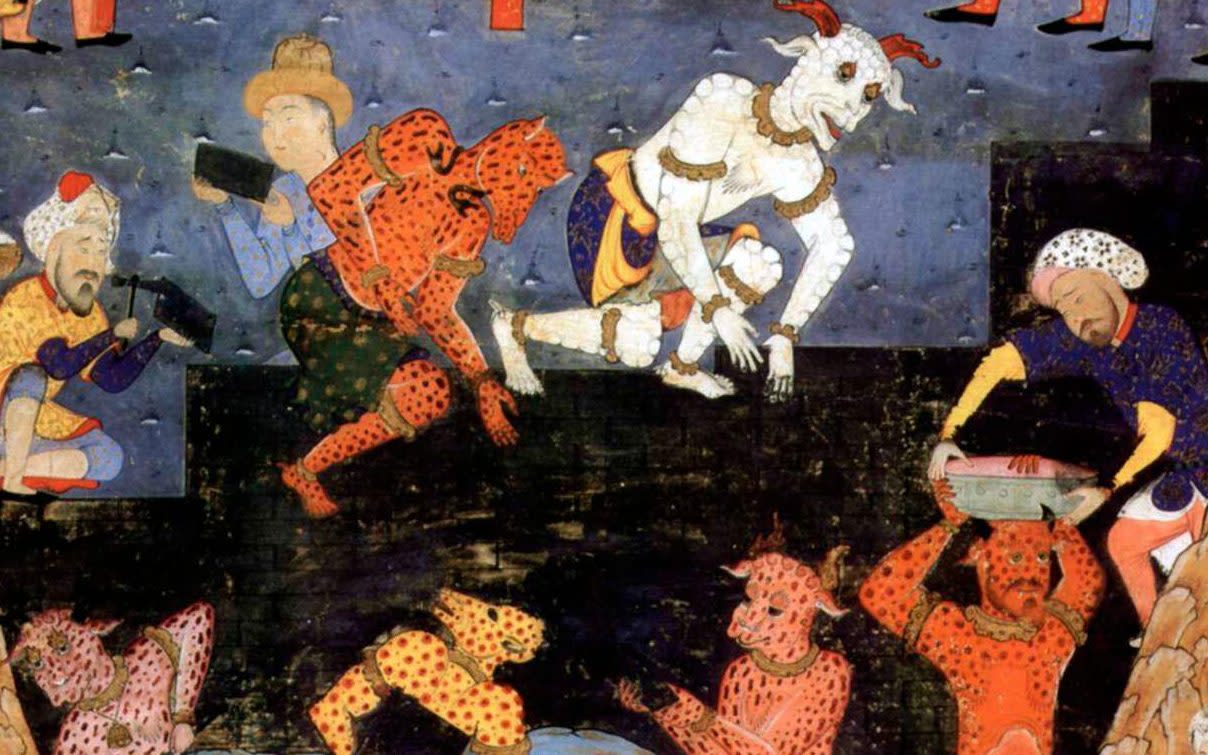Sacred Mysteries: Gog and Magog’s crimes are still punished in Iran today

- Oops!Something went wrong.Please try again later.
One of the most enjoyable parts of the Koran for outsiders like me is Surah 18, “The Cave”, which includes some curious old tales, such as the one about the sleepers in a cave who slept for 309 years. In the West they were known as the Seven Sleepers.
Another tale in the surah concerns Dhul-Qarnayn, a name that means Two Horns. He builds a great wall of iron and brass to keep out Gog and Magog until the Last Judgment. This episode found its way into the medieval European Alexander Romance, about Alexander the Great, who was also credited in the romance with venturing in a submersible under the sea.
In the Koran, Dhul-Qarnayn helps protect a people with the wall against Gog and Magog because they are said to be “spreading corruption through the Earth”. But it seemed to me quite a stretch from the wickedness of Gog and Magog to a present-day crime in Iran.
An Iranian rapper, Toomaj Salehi, 32, sentenced to six years and three months in jail was found guilty of “corruption on Earth” after backing anti-government protesters. The phrase for this crime in Persian is, I think, mofsed-e-filarz.
The late Ayatollah Khomeini explained that corruption on Earth was the opposite of “a favourable social environment for the education of believing and virtuous individuals”. He said that “this corruption must be swept away, and its instigators punished for their deeds. It is the same corruption that the Pharaoh generated in Egypt with his policies, so that the Qur’an says of him, ‘Truly he was among the corrupters’ (28:4)”.
“A believing, pious, just individual cannot possibly exist in a socio-political environment of this nature,” Khomeini maintained, and so had to choose between acts that amount to kufr (unbelief) or opposing taghut (earthly tyrannical power). His revolutionary conclusion was that “we have in reality, then, no choice but to destroy those systems of government that are corrupt in themselves”.
Canada’s Immigration and Refugee Board has examined “corruption on Earth” as a crime in Iranian law. It found one source that put it among crimes that incurred hudud (singular: hadd) punishments, that is mandatory punishments for crimes against God.
But the Canadian report presented the more likely view of the political scientist Professor Nader Entessar that “corruption on Earth” did not figure among hudud crimes. This may be of little help to those found guilty, since Iran’s Islamic Revolutionary Court, which has jurisdiction over crimes of “corruption on Earth”, is perfectly capable of imposing capital sentences.
Contrarily, hudud punishments have, in most Islamic countries most of the time, been heavily restricted. Both in Sunni and in Shia Islam, religious law is very developed, even if sometimes surprising to outsiders. Take theft, which can be subject to the hadd punishment of amputating a hand.
The renowned Damascan judge Taqi al-Din al-Subki (AD 1284-1355) found more than 80 circumstances that had to be fulfilled if a theft was to be subject to the hadd penalty. It would have to be theft by a Muslim of sound mind and not be food or drink, a fowl or a dog, dung or a donkey, a copy of the Koran or a human being, or taken from a family member, and only if there are two male witnesses, and so on.
Again, punishment is also mandatory for false accusations of illicit sexual intercourse because the hudud punishments (stoning or lashing) for it are so serious.

